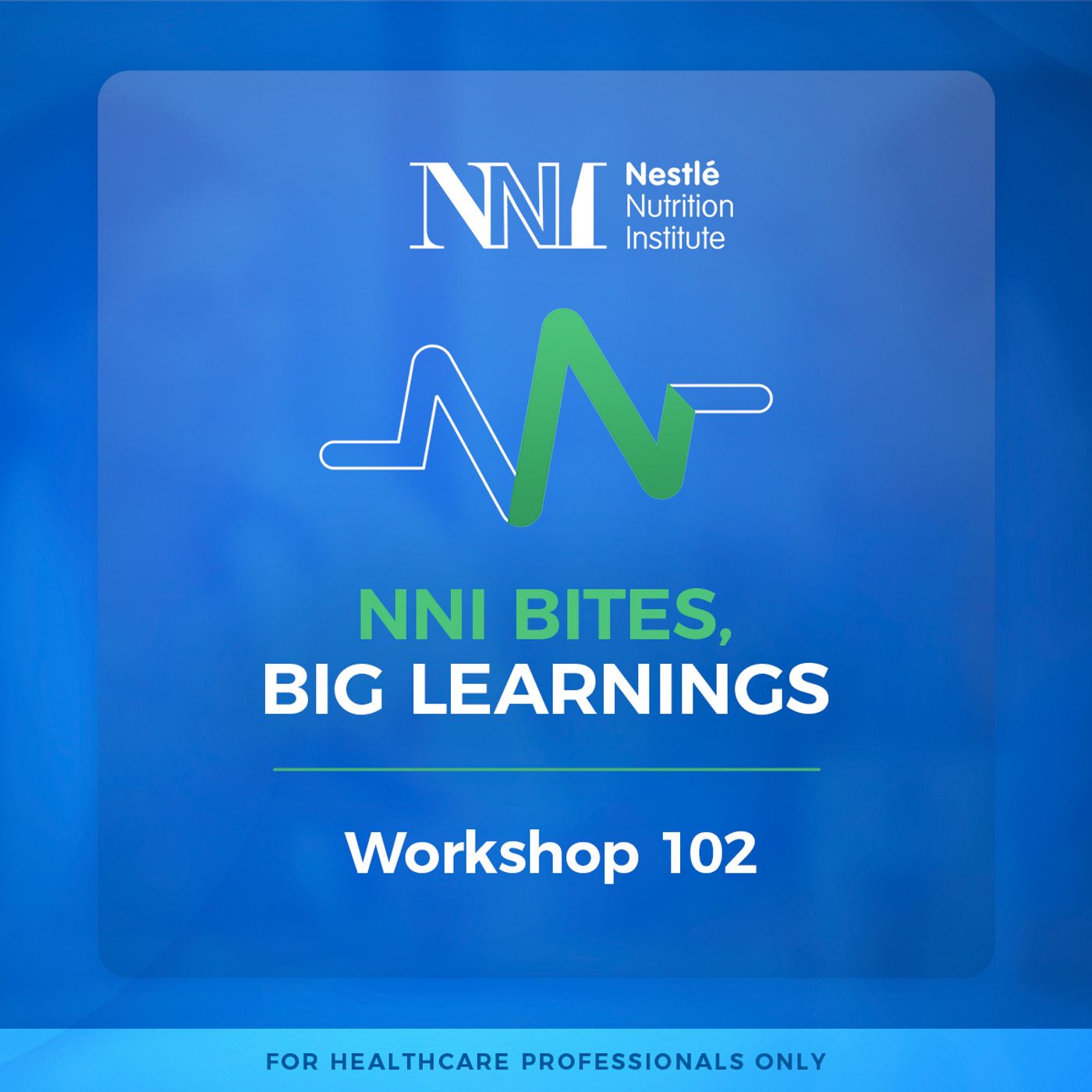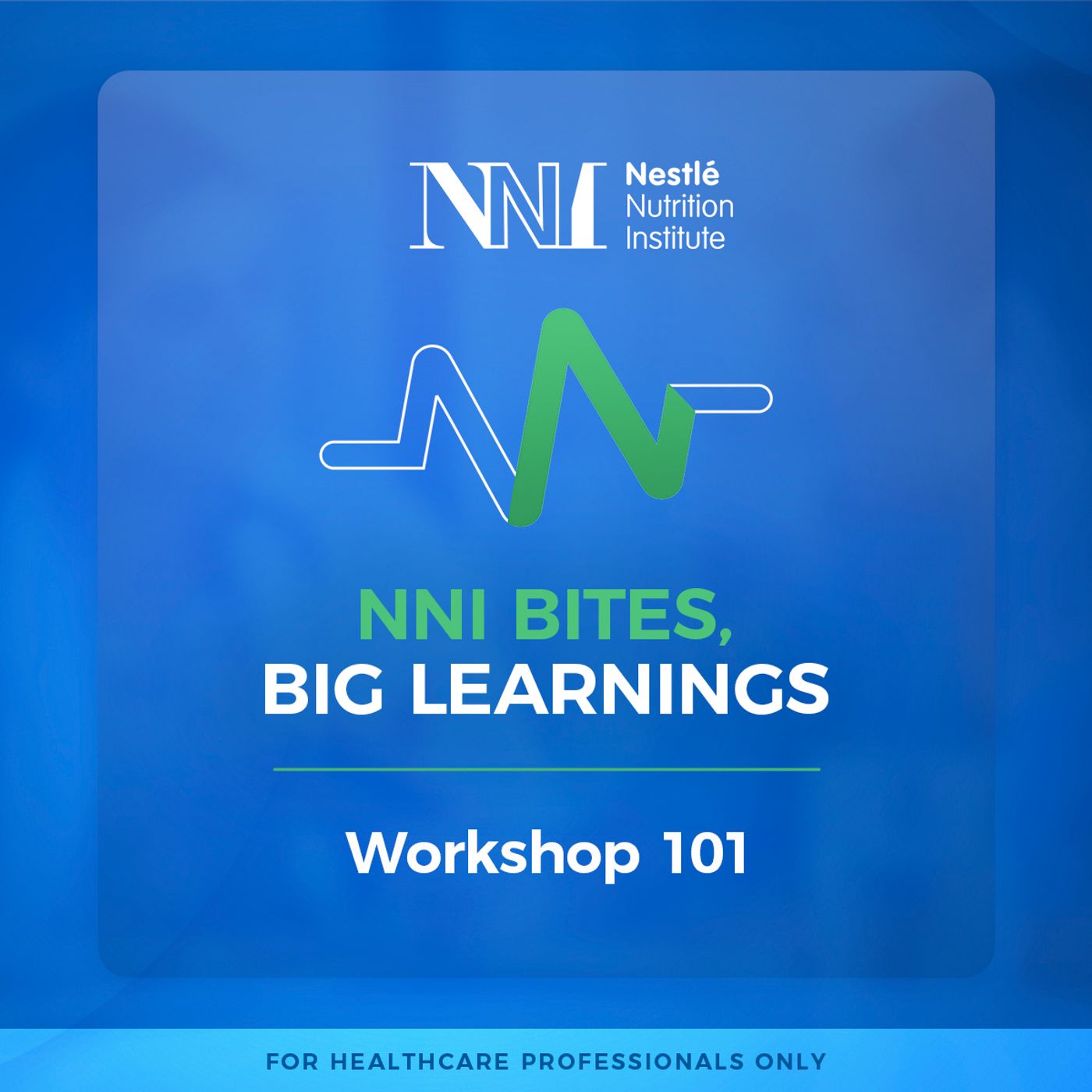Discover NNI BITES, BIG LEARNINGS
NNI BITES, BIG LEARNINGS

NNI BITES, BIG LEARNINGS
Author: Nestlé Nutrition Institute
Subscribed: 3Played: 62Subscribe
Share
© Copyright Nestlé Nutrition Institute
Description
Welcome to the NNI Podcast brought to you by Nestlé Nutrition Institute.
NNI BITES, BIG LEARNINGS is a comprehensive podcast series that brings together esteemed experts from across the globe to explore the latest advancements in pediatric and maternal nutrition. With a practical approach, each episode offers valuable insights and actionable knowledge, empowering clinicians to effectively translate the latest scientific findings into their clinical practice. This podcast series serves as an useful resource, providing clinicians with a wealth of information to address various nutritional challenges and find innovative solutions.
NNI BITES, BIG LEARNINGS is a comprehensive podcast series that brings together esteemed experts from across the globe to explore the latest advancements in pediatric and maternal nutrition. With a practical approach, each episode offers valuable insights and actionable knowledge, empowering clinicians to effectively translate the latest scientific findings into their clinical practice. This podcast series serves as an useful resource, providing clinicians with a wealth of information to address various nutritional challenges and find innovative solutions.
54 Episodes
Reverse
Dr. Esther Van de Voort expounds on the urgent need to transform food systems for greater resilience, efficiency, and sustainability. This shift is vital to address global food security, nutrition, and rural livelihoods, all under threat from climate change, economic disruptions, and inequality. With 28.9% of the global population food insecure, and hunger rising since the pandemic, digital solutions and data offer opportunities to optimize agricultural production and supply chains.For Healthcare Professionals OnlyNestlé Nutrition Institute
Dr. Keith Godfrey talks about how maternal nutrition and prenatal factors shape fetal growth and influence long-term offspring health, including cardiovascular, neurobehavioral, and metabolic outcomes. Maternal constraints like body composition, metabolism, and diet quality influence fetal development. The episode emphasizes intervention strategies to improve maternal health before and during pregnancy, reducing chronic disease risks in offspring. It also highlights the critical impact of micronutrient deficiencies during pregnancy on fetal development and later health, independent of birth weight, and calls for targeted policies to enhance preconception and antenatal health.For Healthcare Professionals OnlyNestlé Nutrition Institute
Dr. Oraporn Dumrongwongsiri explains how breastfeeding provides optimal infant nutrition and reduces the risk of obesity and type 2 diabetes later in life. She delves into the biological mechanisms behind these protective effects, including the role of breast milk composition, feeding methods, epigenetics, hormonal influences, gut microbiome development, and early shaping of food preferences.For Healthcare Professionals OnlyNestlé Nutrition Institute
Dr. Berthold Koletzko discusses how optimizing infant and young child feeding reduces the risk of non-communicable diseases. In numerous studies, breast milk’s lower protein content is a proposed mechanism in lowering childhood obesity risk. Reducing protein intake in formula-fed infants can significantly reduce their risk of obesity at school age. Limiting cow’s milk consumption and promoting exclusive breastfeeding help prevent rapid weight gain and obesity in children. These strategies, alongside proper weaning and nutritional education, support optimal growth trajectories and long-term health outcomes.For Healthcare Professionals OnlyNestlé Nutrition Institute
Dr. Kevin Chen discusses how China's economic growth has increased consumption of animal-sourced foods, affecting public health, food security, and the environment. Shifting to plant-based diets could improve health outcomes and sustainability, but challenges like ingrained food habits, limited nutritional awareness, and cost persist as barriers. Strategic actions, including tailored diet guidelines and agrifood system reforms, are key to promoting a sustainable, healthy dietary future.For Healthcare Professionals OnlyNestlé Nutrition Institute
Dr. Zakari Ali discusses the global food system's impact on health, society, and the planet, noting that food production accounts for 25% of global greenhouse gas emissions. While reducing animal-source food intake is often recommended for health and environmental benefits, regions like The Gambia may need to increase it to combat malnutrition. Region-specific solutions are crucial, as a universal approach cannot effectively address global nutrition and sustainability goals.For Healthcare Professionals OnlyNestlé Nutrition Institute
Dr. Hema Divakar expounds on adolescence as a critical phase for addressing nutrition to prevent undernutrition, obesity, and micronutrient deficiencies. Addressing deficiencies in calcium, iron, protein, and other nutrients is essential to support bone health, cognitive function, and overall development. Establishing healthy dietary habits during this stage, particularly for girls, prepares them for future pregnancies and promotes long-term health. Investing in adolescent health offers "triple dividends"—immediate benefits, enhanced adult productivity, and reduced health risks for future generations.For Healthcare Professionals OnlyNestlé Nutrition Institute
Dr. Nicolas Bonnet introduces the concept of the "gut musculoskeletal axis," emphasizing the role of the gut microbiome in child musculoskeletal health. He highlights microbiome-driven mechanisms, including short-chain fatty acid production, mineral absorption regulation, and immune modulation, in bone and muscle development during early life. Based on the findings of a randomized controlled trial, he discusses how a young child formula with the synbiotic L. reuteri + GOS enhances bone strength, muscle function, and induction of microbiome changes in healthy young children.For Healthcare Professionals OnlyNestlé Nutrition Institute
Dr. Usha Ramakrishnan provides a compelling look at the impact of environmental exposures on child growth and development, going beyond the traditional focus on nutrition. She emphasizes that targeted interventions, such as optimal nutrition, clean air, and nurturing care, can reduce these risks. While exclusive breastfeeding offers clear benefits, the impact of improved WASH conditions on growth remains inconsistent, underscoring the need for integrated strategies.For Healthcare Professionals OnlyNestlé Nutrition Institute
Dr. Aryeh Stein emphasizes the critical importance of the first 1,000 days, a period of rapid growth when children are most vulnerable to inadequate nutrition. Socioeconomic factors are shown to heavily influence growth outcomes, with children from poorer households consistently shorter, both within and across countries. This episode discusses the need to address these inequities to ensure optimal growth for all. While measures like height-for-age and stunting effectively track population-level growth, should not be used clinically for individual diagnosis. Dr. Stein calls for targeted interventions to combat undernutrition in low-income countries and tackle the growing issue of overweight in middle-income nations.For Healthcare Professionals OnlyNestlé Nutrition Institute
Dr. Andrew Prentice explains how human growth patterns, shaped by evolutionary adaptations like bipedalism and larger brains, result in slower growth rates compared to other mammals. This allows extended brain development and learning, with breastfeeding playing a vital role. These evolutionary insights highlight the importance of tailored nutrition and care to support child growth and cognitive development.For Healthcare Professionals OnlyNestlé Nutrition Institute
Dr. Sarah Cusick shares that the first 1,000 days of life are crucial for brain development. Nutrient deficiencies during this critical period can affect neurodevelopment. Key nutrients like proteins, long-chain polyunsaturated fatty acids, iron, and iodine play vital roles in brain growth and function. Proper timing, dosage, and duration of interventions are essential to support optimal cognitive development and long-term mental health.For Healthcare Professionals OnlyNestlé Nutrition Institute
Dr. Linda Adair discusses the regulation of healthy linear growth in young humans, emphasizing the interplay of genetic, hormonal, nutritional, and psychosocial factors from conception to adolescence. She highlights how environmental factors such as stress and nutrient availability affect growth during critical periods, offering insights to address growth faltering beyond nutritional causes.For Healthcare Professionals OnlyNestlé Nutrition Institute
Dr. Ahmad Suryawan delves into the significance of the critical and sensitive periods in child development, how these unique windows influence lifelong brain architecture. He explains that critical periods are brief, irreversible windows when brain circuits are highly responsive to nutrition and environmental input, while sensitive periods, though broader, offer some flexibility, though at a higher effort and cost.For Healthcare Professionals OnlyNestlé Nutrition Institute
Dr. Georg Gerber gives an overview of how Artificial Intelligence (AI) is applied in microbiome research today — a timely topic which includes recent case studies, ethical considerations, challenges, as well as future trends and integration in clinical practice.For Healthcare Professionals OnlyNestlé Nutrition Institute
Dr. Alexandra Zhernakova expounds on the infant gut virome, discussing the current understanding of its role in infant health and development, along with recent research breakthroughs. This episode also explores how evolving research in this field may impact future clinical practice.For Healthcare Professionals OnlyNestlé Nutrition Institute
Dr. Andrew Bartko defines the term “Microbiome Science” and explains its importance for human health and wellness. Additionally, the episode discusses the global microbial biodiversity crisis, and how microbiome sequencing may be able to improve patient health in the future. For Healthcare Professionals OnlyNestlé Nutrition Institute
Dr. Rodrigo Vazquez defines what Disorders of Gut-Brain Interaction (DGBIs) are and how the gut microbiota impacts the gut-brain axis. He also shares how these disorders manifest in patients and whether there is evidence that probiotics can help manage DGBIs in infants. For Healthcare Professionals OnlyNestlé Nutrition Institute
Dr. Bruno Barreto expounds on the relationship between decreasing microbial diversity and increasing food allergy in the modern world. This episode also dives into interventions to support a healthy gut microbiota in preventing food allergies, such as the important role of breastfeeding.For Healthcare Professionals OnlyNestlé Nutrition Institute
Dr. Siddarth Venkatesh elaborates on the role of the gut microbiome in child’s nutrition, highlighting the differences in the microbiome of healthy and malnourished children. The discussion also suggests how specific foods can support the development of a healthy gut microbiome in malnourished infants.For Healthcare Professionals OnlyNestlé Nutrition Institute






